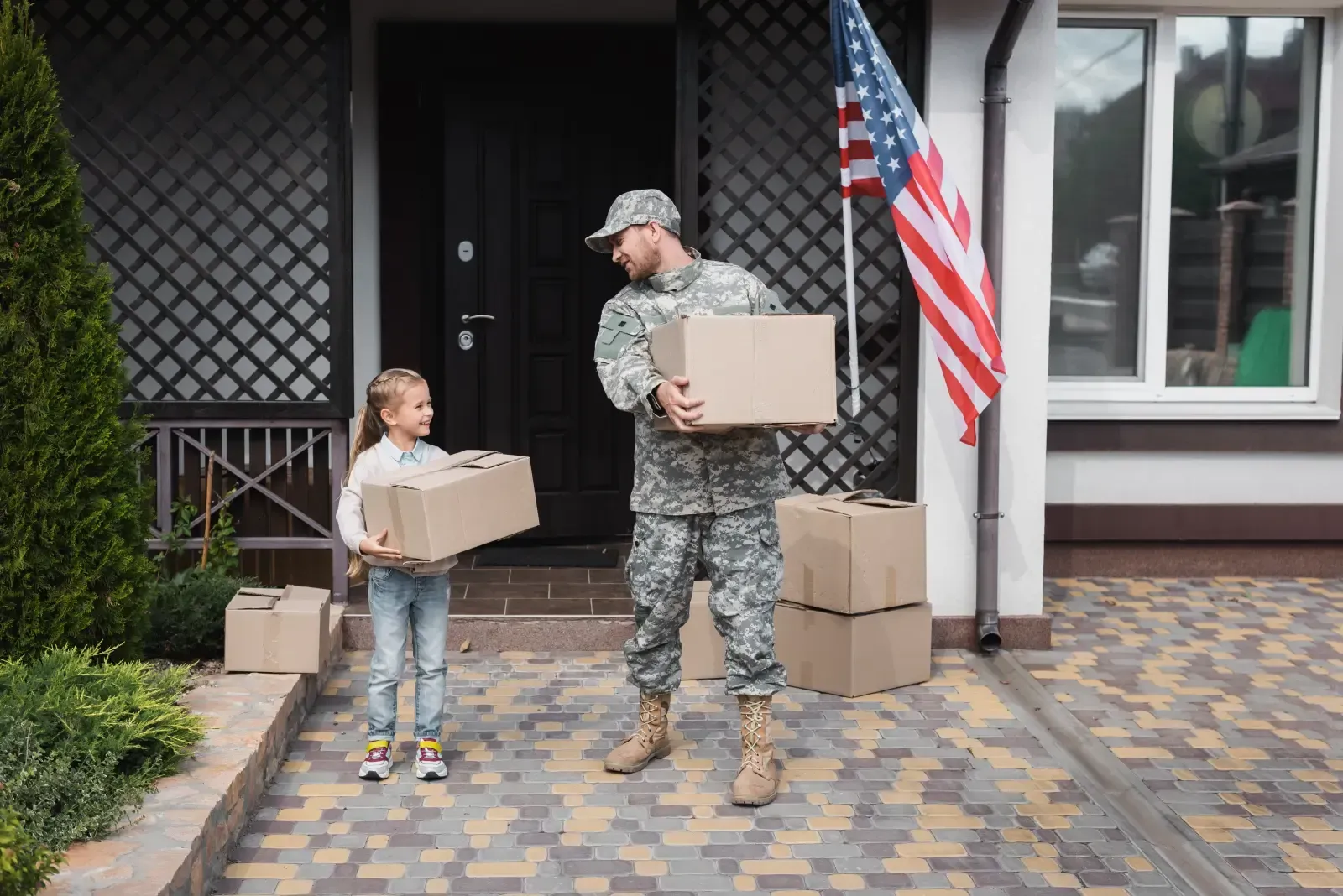A permanent change of station (PCS) move can feel overwhelming, but with the right planning and preparation, you can make your military relocation smooth and stress-free. Whether this is your first PCS or your fifth, our comprehensive military moving guide will help you navigate every step of the process.
Stewart Moving & Storage started more than 25 years ago solely as a military moving company, and we’ve been honored to help military families transition to their new homes ever since. Based on our experience, we’ve compiled the military moving tips and Army PCS tips that really make a difference.
Learn more:
- How To Move Heavy Furniture By Yourself: 19 Easy Ways & Tricks
- A Checklist for Virginia Residency Requirements 2026
- Top 10 Safest Cities in Virginia
What is a PCS or military move?

PCS stands for Permanent Change of Station – a military term for the relocation of active duty service members and their families from one military installation to another. A PCS move is often an involuntary reassignment, which means you may have limited time to prepare and organize your home for transport.
During a PCS move, the military typically covers transportation costs for your belongings through the Defense Personal Property Shipping Office (DDPSO). However, some military families opt for a DITY move (Do It Yourself move), where you handle the relocation yourself and receive a reimbursement based on what the military would have spent.
Military moving isn't just a change of address – it's a life transition that affects your entire family. Understanding the process and preparing with these solid PCS military move tips will help reduce stress and ensure everything arrives at your new duty station safely and on time.
Learn more: Ultimate PCS DITY Move Guide 2026
Military Moving Tips Before Packing
1. Start Early
Don't wait until the last minute! The earlier you begin preparations, the less chaotic the process becomes.
Start by contacting the transportation office at your current installation to understand your specific move details, including weight allowances, pickup dates, and delivery timelines. If you're considering a DITY move, begin gathering quotes from professional movers immediately. Military movers like Stewart Moving & Storage can provide estimates well in advance.
2. Declutter
Before you pack a single box, it's time to be ruthless about what you actually need and want to move to your new duty station. Military weight allowances are limited based on rank and family size, so decluttering isn't just smart – it's necessary.
Go through each room and sort items into categories: keep, donate, sell, or trash. Be honest about what you've been holding onto just because. This is your chance to start fresh at your new posting.
Selling items online through Facebook Marketplace, military Facebook groups, or eBay can put money in your PCS fund while lightening your load. Donating to local charities supports your military community and provides tax deductions. The less you pack, the lower your moving costs, making decluttering one of the most practical Army PCS tips available.
3. Create a Moving Binder
Organization is one of our strongest military PCS tips. Create a physical or digital binder to keep all your moving documents in one place.
Your moving binder should include:
- Copies of your PCS orders
- Contact information for the transportation office and your movers
- Inventory lists of your belongings
- Photos of valuable items like family heirlooms and electronics
- Moving timelines and checklists
- Receipts for any move-related expenses
- Medical and school records for your family
Having everything organized means you won't waste time searching for crucial information when you need it most.
Learn more: How to Plan a Military Move
4. Research Your New Location
Understanding your new duty station and community reduces anxiety and helps your family prepare emotionally for the transition. Take time to research your new location as part of your military PCS planning.
Learn about the climate, cost of living, local schools, recreational opportunities, and community resources. Visit military-focused websites and social media groups for your new installation to connect with families already stationed there. They can provide invaluable insights about neighborhoods, schools, local amenities, and what to expect.
5. Build a PCS Fund
PCS moves involve unexpected expenses beyond what the military covers. Creating a dedicated PCS fund helps you handle these costs without financial stress.
Typical PCS expenses that may not be covered by military moving reimbursement include:
- Temporary lodging while awaiting housing
- Meals during travel
- Travel costs for your family to reach the new duty station
- Security deposits and utility setup fees at your new home
- Minor repairs or updates needed at your new residence
Financial planning reduces stress and gives you flexibility to handle unexpected situations during your PCS military move. Learn more about PCS move cost.
6. Prepare Your Family and Housing
A military move affects your entire family, so prepare everyone for the transition. Discuss the move with your spouse and children, explaining what to expect and addressing their concerns.
For children, this might mean:
- Learning about their new school and community
- Connecting with other military kids at your new station
- Arranging playdates or visits after the move
- Keeping familiar items and routines consistent
If you have pets, research veterinary services at your new location and arrange any necessary health certificates or quarantine requirements for your move. Pets experience stress during relocations, too, so planning their transition is part of our comprehensive PCS tips for military families.
Learn more: How To Pack Plates and Dishes For Moving, Tips Keep Plates Safe
Military Moving Guides During the PCS Process
1. Set up your move
Once you've received your move date from the transportation office, contact your chosen moving company to schedule pickup. If using military-approved movers, coordinate directly with the DDPSO. For DITY moves, work with your moving company to arrange convenient pickup and delivery dates.
Confirm all details with your movers: exact pickup date and time, delivery window, any special handling instructions for valuable items, and contact information for both parties. Ask about their process for documenting your household goods and what happens if items are damaged during transport.
This is also the time to arrange transportation for your vehicles if you're moving across the country. Discuss vehicle shipping options with your moving company – many offer comprehensive services that simplify the process.
2. Document everything
Thorough documentation protects you during a military move and ensures you have evidence of your household goods' condition before and after transport. This is crucial military moving guidance.
Before movers arrive, photograph and video record all items, especially valuable or fragile pieces. Note any existing damage on furniture or electronics. Create a detailed inventory list including descriptions, estimated values, and quantities of items being moved.
Upon delivery, inspect items as they're unloaded and note any new damage immediately. Document issues with photos and timestamps. This thorough documentation process protects your interests if claims become necessary.
3. Designate a "do not pack" zone
Create a specific area in your home that movers are not to pack. This zone should contain items you need daily, medications, important documents, electronics, and irreplaceable family heirlooms.
Your "do not pack" zone typically includes:
- Original documents (birth certificates, military orders, medical records)
- Medications and medical equipment
- Jewelry and valuable items
- Electronics and chargers
- Personal hygiene items
- Change of clothes and comfortable moving day attire
- Snacks and beverages
- Children's comfort items (favorite toy, blanket, stuffed animal)
Make this zone clearly visible and communicate its purpose to movers. Place items in a marked section of your home – perhaps a bedroom or office – where movers understand they should not touch. Keeping these essentials with you ensures you have what you need regardless of delivery delays.
Learn more: How Does a Military Move Work? PCS Moving Guide 2026
4. Prepare an "open first" box
Pack a special box containing items you'll need immediately upon arrival at your new home. Label this box clearly as "OPEN FIRST" and communicate its location to your movers.
Your "open first" box should include:
- Toiletries and medications
- Phone chargers and electronics
- Bed linens and pillows
- Basic kitchen essentials (plates, cups, utensils, can opener)
- Toilet paper and paper towels
- Flashlight and batteries
- Tools for basic assembly
- First aid kit
- Change of clothes for each family member
Having these essentials immediately accessible makes your first night in your new home infinitely more comfortable. You won't need to search through dozens of boxes just to find a toothbrush or make a bed.
5. Working with movers
Clear communication with your military movers is essential for a successful move. Before they arrive, provide them with detailed instructions, including:
- Any items requiring special handling or care
- Tight spaces, narrow hallways, or stairs in your current home
- Large items that might require disassembly
- Items you're not shipping (clearly mark these items)
- The layout of your new residence (if available)
- Any obstacles or access issues at your new location
Be present during the packing and loading process if possible. This allows you to answer questions, point out special items, and verify that everything is being handled appropriately. Keep contact information for your movers readily available and stay in touch throughout the moving process.
Learn more: 30+ Moving & Packing Tips for Easier, Smoother, and Stress-free Moves
PCS military move tips after the move
1. Check your household goods
Upon delivery, carefully inspect all items as they're unloaded from the truck. This is one of the most important PCS move tips for protecting yourself after the move.
Document any damage with photos and timestamps. Note discrepancies between the delivery inventory and what actually arrives. If items are damaged or lost, file a claim with the moving company and transportation office according to their specific procedures. Keep all documentation and photos as evidence for your claim.
2. Prepare for temporary lodging
If your new home isn't ready when your household goods arrive, you may need temporary lodging. Many military installations offer on-base temporary housing, but availability varies.
Contact your new installation's housing office in advance to understand temporary housing options and availability. Some families choose to stay in hotels or rental properties while awaiting permanent housing. Plan accordingly and budget for these expenses through your PCS fund.
DOD-approved storage may be available through your moving company if there is a gap between your move and when your housing is available.
Learn more:
- 7 Essential Cross-Country Moving Tips: Complete Guide
- 10 Packing Tips for a Long-Distance Move from Expert
3. Utilize support networks
The military community understands PCS moves because nearly everyone experiences them. Tap into existing support networks to ease your family's transition.
Take advantage of:
- Military family readiness groups at your new installation
- Spouse support organizations
- Religious and spiritual communities
- School parent organizations
- Neighborhood association groups
- Online military family communities
These networks provide friendship, practical advice, and emotional support during your transition. Military families often become lifelong friends because they understand the unique challenges of military life, including frequent relocations.
4. Find a new home for unwanted items
Despite your best decluttering efforts, you may arrive at your new duty station with items you don't want to keep. Rather than letting them clutter your new space, find them new homes quickly.
Options include:
- Selling items on military Facebook groups or eBay
- Donating to local charities or thrift stores
- Offering items to military family readiness groups
- Listing free items on Craigslist or Facebook Marketplace
- Asking friends or neighbors if they need anything
Acting quickly prevents unwanted items from becoming long-term clutter and creates space for your new life at your new posting.
5. Finalize administrative requirements
Moving to a new duty station involves numerous administrative changes. Create a checklist to ensure you handle everything:
- Update address with the military, TRICARE, and VA (if applicable)
- Enroll children in new schools
- Establish healthcare with new military medical facilities
- Register vehicles with your new state
- Update driver's licenses and state identification
- Notify banks and insurance companies of address changes
- Update subscriptions and memberships
- Register to vote in your new location
- Update emergency contacts with your chain of command
Handling these administrative tasks promptly prevents problems later and helps your family settle into your new community more smoothly.
Learn more: Out-of-State Moving Tips: Ultimate Guide
Common mistakes to avoid when preparing for a military or PCS move
Military families often make preventable mistakes that complicate their moves. Learning from others' experiences helps you avoid unnecessary stress.
- Packing PCS prohibited items: Military movers cannot pack certain items, including hazardous materials, flammables, ammunition, and perishable foods. Pack these items yourself or dispose of them appropriately.
- Exceeding weight limits: Every military member has a weight allowance based on rank and family size. Exceeding this limit can result in out-of-pocket expenses to cover the excess weight. Weigh your shipment before pickup to avoid surprises.
- Not documenting items: Failing to document your household goods before the move makes it difficult to prove damage or loss. Always photograph items and maintain detailed inventory lists.
- Ignoring deadlines: Military timelines are strict. Missing appointment deadlines or failing to coordinate with movers creates complications. Calendar every important date and set reminders well in advance.
- Forgetting to arrange pet transportation: Pets need special arrangements during moves. Plan pet transportation and veterinary care in advance rather than scrambling at the last minute.
- Starting too late: Procrastination is the enemy of smooth military moves. The more time you allow for preparation, the less stressful the process becomes.
Learn more: How Much to Tip Movers 2026: Complete Tipping Guide
Trusted and High-Rated Military Moving Services by Stewart Moving & Storage
Stewart Moving & Storage specializes in military moving, and we understand the unique challenges of executing these PCS military move tips. With over 25 years of experience serving military families, we've earned a reputation for reliability, honesty, and exceptional service.
Our military moving services include:
- Professional packing and unpacking
- DOD-approved storage
- Secure, reliable transportation
- Moving coordinators who specialize in military moves
- Moving teams who are eager to serve military families and ease your transition to a new station
Stewart Moving & Storage is proud to serve military families at installations across our operating regions. We're committed to making your experience as smooth as possible, treating your move with the care and attention your family deserves.
FAQs about Military Moving Tips
Am I supposed to tip military movers?
Tipping is not required for military movers, as many are government employees or work for government-contracted companies. However, if your movers are hired for a DITY move, tips are appreciated.
If you decide to tip, consider:
- Monetary tips ($1-5 per mover is typical)
- Providing beverages and healthy snacks throughout the moving day
- Writing an online review or a thank-you note to the moving company
Check your specific military branch's regulations regarding tips, as policies may vary. Government movers often have restrictions on accepting gifts or tips, so it's best to ask if you're unsure.
How to prepare for a military move?
Preparing for a military move involves multiple steps outlined in our comprehensive military moving guide above. In summary:
- Start early upon receiving PCS orders
- Declutter your household goods
- Research your new duty station and community
- Contact movers and schedule your move
- Create detailed inventories and document your belongings
- Prepare "do not pack" zones and "open first" boxes
- Arrange housing and temporary lodging/storage if needed
- Handle administrative changes of address
- Stay organized with a moving binder
- Maintain clear communication with movers throughout the process
The more thoroughly you prepare, the smoother your military move will be.
What will military movers not pack?
Military movers have strict regulations about items they cannot pack. Prohibited items typically include:
- Hazardous materials (paint, pesticides, cleaning supplies, gasoline)
- Flammable items (lighter fluid, fireworks, propane)
- Explosives and ammunition
- Perishable foods
- Plants (in some cases)
- Pets
- Irreplaceable documents
- Medications
- Valuables and jewelry
- Propane grills and tanks
- Firearms (in some cases)
Pack prohibited items yourself for transport in your personal vehicle. Contact the transportation office for a complete list of prohibited items specific to your military branch.
How long does it take military movers to move your stuff?
The duration of a military move depends on several factors:
- Household size
- Distance of your move
- Delivery timeline
- Special circumstances, like vehicle shipment or storage needs
Plan for flexibility and avoid scheduling important appointments immediately after your delivery window ends. Allow extra time for unpacking and settling into your new home.



